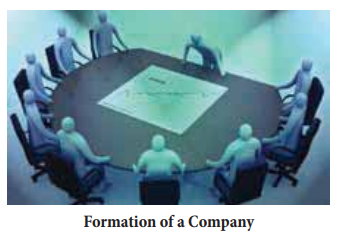Chapter: 11th Commerce : Chapter 6 : Joint Stock Company
Characteristics of a Joint Stock Company
Characteristics
A company as an entity has many distinct features which together make it a unique organization. The essential characteristics of a company are as follows:
i. Separate Legal Entity
Under Incorporationa company becomes a separate legal entity as compared to its members. The company is distinct and different from its members. It has its own seal and its own name, its assets and liabilities are separate and distinct from those of its members. It is capable of owning property, incurring debt, and borrowing money, employing people, having a bank account, entering into contracts and suing and being sued separately. In short, it is considered as an artificial person created by law.
ii. Limited Liability
The liability of the members of the company is limited to contribution to the assets of the company upto the face value of shares held by him. A member is liable to pay only the uncalled money due on shares held by him. If the assets of the company are not sufficient to pay liabilities, the personal properties of the shareholders are not held responsible.
iii. Perpetual Succession
A company does not cease to exist unless it is specifically wound up or the task for which it was formed has been completed. Membership of a company may keep on changing from time to time but that does not affect life of the company. A company is created by law and it can be windup only through legal process.

iv. Separate Property
A company is a distinct legal entity. A member cannot claim to be owner of the company’s property during the existence of the company.
v. Transferability of Shares
Sharesinacompanyarefreelytransferable. When a member transfers his shares to another person, the transferee steps into the shoes of the transferor and acquires all the rights of the transferor in respect of those shares. There are restrictions in the transferability of shares in case of private companies.
vi. Common Seal

A company is an artificial person and does not have a physical presence. Thus, it acts through its Board of Directors for carrying out its activities and entering into various agreements. Such contracts must be under the seal of the company. The common seal is the official signature ofthe company. The name ofthe company must be engraved on the common seal. Any document not bearing the seal of the company may not be accepted as authentic and may not have any legal force.
vii. Capacity to Sue and being sued
A company can sue or be sued in its own name as distinct from its members.
viii. Separate Management
A company is administered and managed by its managerial personnel i.e. the Board of Directors. The shareholders are simply the holders of the shares in the company and need not necessarily the managers of the company.
ix. One Share-One Vote
The principle of voting in a company is one share-one vote i.e. if a person has 10 shares, he has 10 votes in the company. This is in direct distinction to the voting principle of a co-operative society where the “One Member - One Vote” principle applies i.e. irrespective of the number of shares held, one member has only one vote.
Related Topics